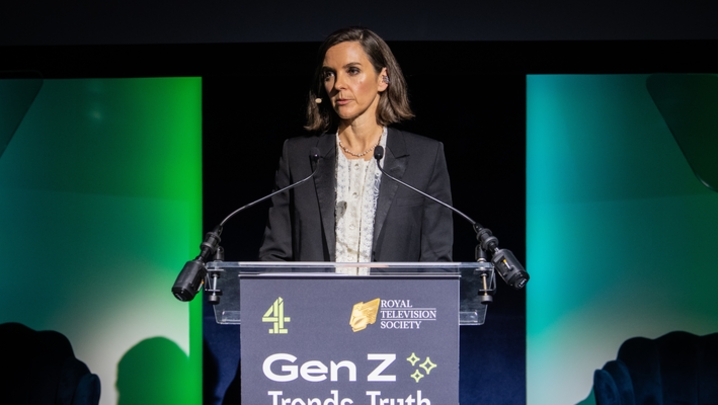Should Channel 4 move its HQ outside London? If so, where? Maggie Brown investigates
At a conference in Salford at the end of March, addressed by the then-culture secretary, Karen Bradley, the cities, nations and regions of the UK were presented with a tantalising opportunity – to bid to become the future home of a relocated Channel 4.
Two weeks later, Bradley swiftly launched a formal consultation on the issue – the week before the general election was called. Answers were requested by 5 July.
When the Conservative Party’s general election manifesto was published last month, it included a pledge to move Channel 4 out of London.
This has made the competition between cities vying for the prize of Channel 4 more intense still.
In the run-up to the recent mayoral elections, Bradley paid a visit to Birmingham, where the West Midlands Conservative candidate Andy Street won a narrow but historic victory on 5 May. “I have been impressed with how quickly Birmingham has been off the blocks on this. Andy was on the phone to me almost immediately with suggestions of what Birmingham could do,” she said.
This included identifying two potential sites for the relocated channel, one close to the proposed new high-speed train station, promised for 2026.
Andy Burnham, former culture secretary and the new Labour mayor of Manchester, also wrote to Bradley. He staked a claim for Salford’s buzzing Media City as the only viable alternative outside London. To Birmingham campaigners, this looked downright greedy.
But even before Street achieved his victory, Bristol mayor Marvin Rees included Channel 4 relocation in his cabinet meeting agenda for 2 May. He tweeted that he wanted “to ensure we are in the running for any relocation”.
Rees then held a Channel 4 relocation event on 24 May. On the guest list were such leading West Country independent producers as Wendy Darke, the former head of the BBC’s Natural History Unit.
“You get a very different picture of life and tastes. London is like visiting another country."
Sheffield is another city cannily preparing a bid for Channel 4 to move there. It is organised by Sheffield’s director of city growth, Edward Highfield. He says: “We feel our values and ethos are incredibly strongly aligned with Channel 4’s. There is a real gap in media production east of the Pennines. Lots of people are talking about Manchester and Birmingham. We don’t think that they are the obvious front-runners.”
He points to Sheffield’s proximity to Leeds, Hull and Derby, and the annual Sheffield Doc/Fest, at which Sheffield is expected to reveal its Channel 4 relocation hand. The city has a site earmarked, next to the station.
In the North East, in Newcastle/Gateshead, it is not clear whether a bid will emerge from the ashes of what was once a television production hotbed that provided Channel 4 with an early hit, The Tube.
Graeme Thompson, pro vice-chancellor of Sunderland University and chair of the RTS’s Education Committee, spells out why the broadcaster should come to the North East: “You get a very different picture of life and tastes. London is like visiting another country. Channel 4 could kick-start a clustering effect here. It would also provide a national broadcaster with a slightly different take.”
It seems unlikely that Glasgow will mount a full bid, as Scotland is set to benefit from a new Scottish BBC television service – and because it is a potential Brexit rebel.
Cardiff is expected to lay a claim, but has the bonus of S4C, and the BBC’s expansive drama studios.
The manifesto pledge and consultation on moving Channel 4 out of London represents a sting in the tail for Channel 4. The move sours its victory in defeating the threat of privatisation, following two years of lobbying.
This allowed CEO David Abraham to confirm in mid-March that he would be leaving. Bradley remarked in her Salford speech that “we are still far apart” over the future of Channel 4, which hands the question of how to settle the relocation debate to his successor.
The idea of relocating Channel 4 was first raised by Bradley last September.
To Channel 4’s shock, the issue gained widespread, cross-party interest – in contrast to privatisation. The rumour mill then produced Birmingham as the frontrunner. Which just happens to be where Theresa May’s joint chief adviser, Nick Timothy, representative of urban, working-class “Erdington” Conservatism, was brought up.
"While the broadcaster wants to work with government on growing the creative economy, a relocation could be expensive and disruptive."
Bradley pointedly said in her Salford speech that it was inadequate that only 3% of Channel 4 jobs were based outside London.
A key part of the last Government’s interest lay in using Channel 4 as part of its policy, announced in 2015’s autumn financial statement, to rebalance the UK’s economy away from London. This aimed to stimulate business through 12 local enterprise partnerships offering business incentives. The strategy built on support for the “Northern Powerhouse” and the “Midlands Engine”.
To counter this open season on relocating Channel 4 outside London, the broadcaster has been busily organising 12 consultations around the UK. Its tone has shifted from hostility towards the idea to a professed willingness to explore the potential ramifications. At a meeting held in Gateshead last month, Channel 4 admitted that it had not been good at engaging with the North East.
It also needs to find allies if it is to remain in the metropolis. The purposebuilt and adaptable headquarters in London’s Horseferry Road is much loved by its occupants.
The network’s outgoing chief creative officer, Jay Hunt, her deputy, Ralph Lee, and marketing chief Dan Brooke have led these discussions. Hunt has gone out of her way to meet independents around the UK since taking up her job in 2011. More recently, Channel 4 commissioners have also been making a lot of visits beyond London.
The message is that, while the broadcaster wants to work with government on growing the creative economy, a relocation could be expensive and disruptive. It also plays on the real fear among some smaller regional independents that relocation could cost them time and money.
They reason that, if the station moves, they would have to make an inconvenient special trip to Channel 4, wherever it is located. Currently, one journey to London allows them to tour all the broadcasters in a day.
The largest independent producers, including TwoFour, All3Media and Endemol Shine, are all backing London and are happy with the status quo because they think relocation could damage Channel 4.
Last month, Channel 4 held a private event in London to discuss relocation. It included representatives from Creative England, the Creative Industries Federation, Equity, Pact, Enders Analysis and Sheffield University professor Sylvia Harvey.
One message that emerged, which commands broad agreement, is that what really matters is where Channel 4’s commissioning money is spent.
This is relevant to the second consultation issue: should the present Channel 4 regional quota of 35% of programme spend be increased to 50%? This has the support of Pact.
There is also a nascent plan to set up regional commissioning editors outside of London in the nations and regions that would mirror production hubs such as Manchester. Setting up an English or regional office is also being considered.
Cat Lewis, CEO at Salford-based Nine Lives and a former chair of Pact’s nations and regions committee, thinks that a workable solution would be to relocate All 4 and the technology team to Birmingham. That would enhance its role as a technology centre.
This would involve around 200 jobs and dovetail with the move of half of BBC Three’s team to the city, and with Birmingham’s role as a training academy and centre for local BBC journalism.
Under this scenario, Channel 4 would keep its advertising sales and programme commissioning together under one roof. The argument is that they depend on one another.
Pact CEO John McVay thinks that the key issue is Channel 4’s capability to maintain its programme spend. “My members are interested in work,” he states. He is, by contrast, highly critical of an offer by Channel 4’s board to invest half of its cash reserves in content ventures.
This still leaves the question of how far Channel 4 is justified in resisting a total relocation on the grounds of defending the institution from damage. And that will be overshadowed by the outcome of the general election. Only then will it be clear how much change will follow from the current consultations and whether Birmingham will win the battle royale.







